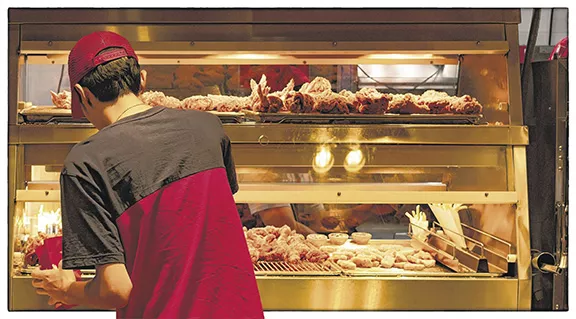For minimum wage workers, this increase means an additional $2,080 this year.
Arizonans passed Prop 206 when the state's minimum wage was $8.05. Beyond 2020, minimum wage is planned to increase based on the cost-of-living changes dictated by the federal Consumer Price Index for Urban Wage Earners and Clerical Workers.
The nonprofit organization Living United for Change in Arizona put Prop 206 on the ballot, which not only increased minimum wage but also mandated paid sick time for employees.
"Most of the stories we've heard from this is that people are using the new funds to help better themselves in the workforce," said Bill Scheel, a Phoenix consultant who aided the nonprofit on the Prop 206 campaign. "They're getting their cars repaired, attending community college classes for job skills, and paying for supplemental classes to educate their kids."
Even before the act went into effect, it proved controversial. Multiple Arizona chambers of commerce unsuccessfully attempted to block the act a month after 58 percent of Arizona voters approved it. More than two years later, chambers of commerce remain critical of the increase.
"Flat out, small businesses, which 85 to 90 percent of our local businesses are small businesses, get crushed," said Amber Smith, President and CEO of the Tucson Metro Chamber. "It's extremely difficult to absorb the cost of minimum wage increasing. It's going to be extremely consistent with what previous impacts have been."
While minimum wage in Arizona is now $12, this is not the case for everyone; employers are permitted to pay employees who receive tips as low as $9 per hour, so long as the tipped employees earn at least minimum wage when their tips are included.
According to the Industrial Commission of Arizona, those employed by their family members, by the State of Arizona or the U.S. government, or by certain small businesses grossing less than $500,000 annually, may still be paid less than $12 per hour. Arizona's minimum wage laws make no distinction between full-time, part-time or temporary employees.
Prop 206 also allows for counties, cities and towns to mandate their own minimum wages, so long as it is not lower than the state minimum wage. While this does not change anything for Tucson, cities like Flagstaff currently have a higher minimum wage than the rest of Arizona.
With this wage increase, Arizona will have one of the highest minimum wages in the nation (tied with Colorado and Maine which also raised to $12 per hour at the beginning of 2020). Arizona is only behind New York, Washington, Oregon and Washington D.C.
"We're so used to being 48th or 49th in national listings, and to be in the top five is awesome, we ought to be really proud," Scheel said. "This benefits not only working-class families, but Arizona as a whole."
While it can be difficult to measure exactly how many hires, fires and business closures resulted from increasing minimum wage, this information can be hinted at from other statistics, such as the unemployment rate and job sector growth.
According to the Bureau of Labor Statistics, Arizona's unemployment rate has not radically changed since voters revised the state's minimum wage laws. Arizona unemployment has fluctuated from 5.2 percent in January 2017, to 4.8 percent in January 2018, to 5.1 percent in January 2019. The state remains roughly one full percent above the national unemployment rate.
"[Increasing minimum wage] can make us less competitive; it's a double-edged sword," Smith said. "We are extremely involved in workforce development, because it is our goal to grow individuals and talent to have a self-sustainable wage. So rather than mandate what someone should get paid, we'd rather support and grow people's ability to gain skills and then earn a higher wage... I think everyone needs to be more focused on how we can better train and build skills so that we can really grow our economy, rather than create these false results."
Prop 206 also requires employers to provide employees upwards for 40 hours of paid sick leave per year, depending on the size of the company.
"More than just the economics of minimum wage, we've seen a change in the way people organize from this, and I think that will continue to affect politics in the coming cycles," Scheel said. "The credit goes to LUCHA, this organization was not well known before this effort, but took a lead that elevated them to national coverage."








